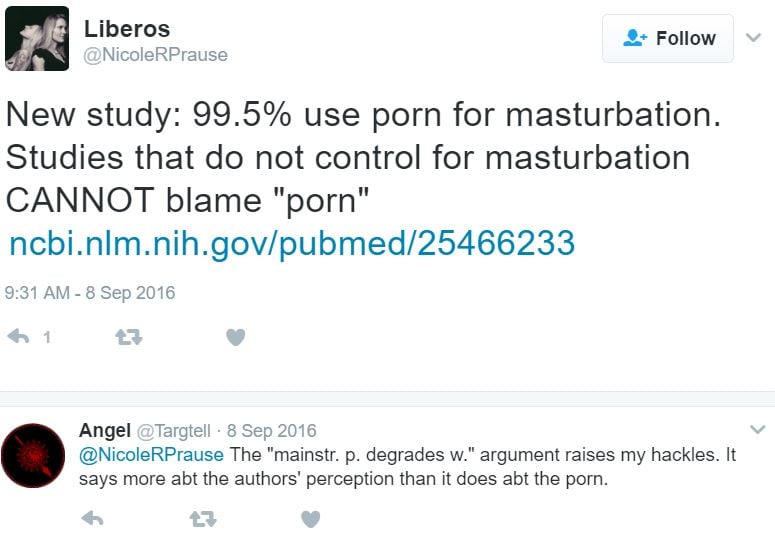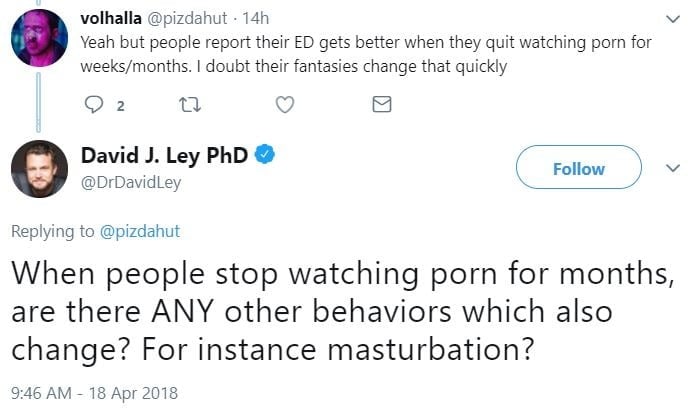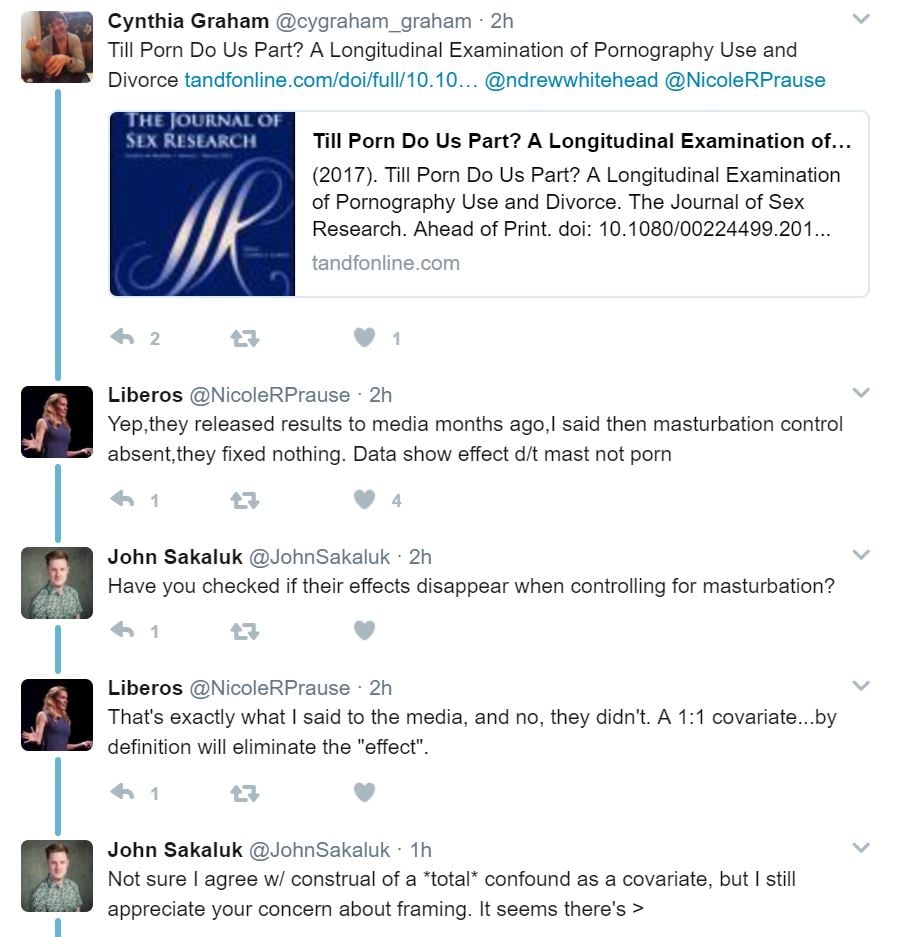Sorry Dr. Perry, it’s the porn. 2021 study guts Perry’s pet theory that masturbation, not porn, is the critical factor in relationship problems. See Pornography and Sexual Dissatisfaction: The Role of Pornographic Arousal, Upward Pornographic Comparisons, and Preference for Pornographic Masturbation (2021).
SHOCKING UPDATE – 2019: Author Samuel Perry confirmed his agenda-driven bias when he formally joined allies Nicole Prause and David Ley in trying to silence YourBrainOnPorn.com. Perry and other pro-porn “experts” at www.realyourbrainonporn.com are engaged in illegal trademark infringement and squatting. The reader should know that RealYBOP twitter (with the apparent approval of its experts) is also engaging in defamation and harassment of Gary Wilson, Alexander Rhodes, Gabe Deem and NCOSE, Laila Mickelwait, Gail Dines, and anyone else who speaks out about porn’s harms. In addition, David Ley and two other “RealYBOP” experts are now being compensated by porn industry giant xHamster to promote its websites (i.e. StripChat) and to convince users that porn addiction and sex addiction are myths! Prause (who runs RealYBOP twitter) appears to be quite cozy with the pornography industry, and uses RealYBOP twitter to promote the porn industry, defend PornHub (which hosted child porn and sex trafficking videos), and attack those who are promoting the petition to hold PornHub accountable. We believe that RealYBOP “experts” should be required to list their RealYBOP membership as a “conflict of interest” in their peer-reviewed publications.
~~~~~~~~~~~~~~~~~~~~~~~~~~~~~~~~~~~~~~~~~~~~~~~~~~~~~~~
Highlights of critique (Perry, 2020):
- Religion researcher Samuel Perry’s new paper is a re-analysis of data used in one of his earlier porn studies.
- It appears that pro-porn ideologues Nicole Prause and David Ley “encouraged” Perry to do this re-analysis. Note: A year later Perry also teamed up with his new wolf pack (Prause, Ley and their chums) to man a website and social media accounts to steal YBOP’s trademark. Trying to silence YBOP’s criticism?
- Back to Perry’s sudden new “insight.” After sophisticated statistical “modeling” Perry proposed that masturbation, not porn use, is the real culprit in relationship problems. This is the very talking point Prause and Ley have been pushing, apparently to try to confuse the public while exonerating porn. See below.
- The gaping hole in Perry’s new analysis is the absence of specific, reliable data on masturbation frequency. Without that, his claim is little more than a hypothetical.
- Perry’s assertions are countered by over 80 studies linking porn use to lower sexual and relationship satisfaction (including 7 longitudinal studies). As far as we know all studies involving males have reported more porn use linked to poorer sexual or relationship satisfaction.
Hatch a new strategy: masturbation is the culprit, not porn… never porn.
The Prause-Ley conundrum: what to do about all the many studies linking porn use to myriad negative outcomes? Given that pro-porn sexologists can pump out only so many dubious studies and opinion pieces, these crafty folks developed a new strategy to support their agnotology campaign: blame all of porn’s ills on masturbation instead. (Say what?)
Thus, in 2016 a few of the porn-science Deniers (Ley & Prause) became the first professionals to try to convince the world that masturbation, not digital porn use, was responsible for the tremendous jump in erectile dysfunction rates in men under 40. The “value” of this audacious talking point lies in its ability to engender doubt in the public mind about porn’s risks. It’s a marvelous distraction from all of the evidence pointing to overuse of internet porn causing harms. Any agnotologist will tell you that the way to undermine the truth is simply to engender doubt in the minds of people who want to continue a self-destructive behavior. Big Tobacco is considered the creator of the “science of agnotology,” by the way.
Let’s be clear. None of the studies the Deniers cite, with one dodgy exception, furnish the least bit of support for their “it’s not porn; it’s masturbation” red herring. The exception is this paper by sociologist S.L. Perry.
History
Let’s take a closer look at how this campaign unfolded.
Again, despite over 100 studies linking porn use to sexual problems and poorer sexual or relationship satisfaction. David Ley and Nicole Prause conjured up a new strategy to prop up their pro-porn propaganda machine: masturbation is the real culprit, not porn use. Can’t be porn.
While this talking point had zero empirical support, and even dares to counter decades of sexology advice that masturbation is not a problem, it became their go-to response to every new study linking porn use to negative outcomes. Even though no urologist agreed with them, Prause & Ley jumped the shark, blaming regular masturbation for chronic erectile dysfunctions in men under 40!
For example, Prause in 2016 trying to dismiss this study’s finding with her usual masturbation straw man:

As you can see, masturbation frequency could have nothing to do with the study’s results:
To test this, we surveyed 487 college men (ages 18-29 years) in the United States to compare their rate of pornography use with sexual preferences and concerns. Results showed the more pornography a man watches, the more likely he was to use it during sex, request particular pornographic sex acts of his partner, deliberately conjure images of pornography during sex to maintain arousal, and have concerns over his own sexual performance and body image.
Not to be out done, Ley blames masturbation for chronic erectile dysfunction in young men:

Again, no urologist agrees with Ley’s assertion that masturbation causes ED in young men (notice that Ley never cites anything for support). However, Ley’s creed is “porn never causes any problems….ever.”
Nicole Prause and David Ley challenge Samuel Perry’s porn studies (did Perry feel threatened enough to re-analyze his original paper?).
Not kidding, as Prause scares a lot people. She has a long history harassment, defamation and maliciously reporting individual and organizations to their governing boards or academic institutions – including researchers, medical doctors, therapists, psychologists, colleagues from her short stint at UCLA, a UK charity, men in recovery, a TIME magazine editor, several professors, IITAP, SASH, Fight The New Drug, Exodus Cry, the academic journal Behavioral Sciences, its parent company MDPI, US Navy medical doctors, the head of the academic journal CUREUS, and the journal Sexual Addiction & Compulsivity (to name a few).

How did Perry respond? Looks like he decided, “If you can’t reason with ’em, join ’em.”
In April, 2019 Perry no longer pretended to be an unbiased researcher. He joined a group to steal YBOP’s trademark. You can see Prause, Ley and Perry prominently featured on the “Real Your Brain On Porn” experts page: https://www.realyourbrainonporn.com/experts. See this page for details: Aggressive Trademark Infringement Waged by Porn Addiction Deniers (www.realyourbrainonporn.com).
Perry’s study lacks accurate data on frequency of masturbation
After sophisticated statistical “modeling,” Perry proposed that masturbation frequency, not porn use, is the real culprit in relationship happiness. The gaping hole in Perry’s new analysis is the absence of specific, reliable data on masturbation frequency, as he only asked “When did you last masturbate?” Without solid data on frequency, his claim is little more than a hypothetical. From Perry’s study:
Masturbation Practice. Both the NFSS and the RIA ask the same two questions about masturbation that the author combined into a single masturbation measure for both surveys. Participants were first asked if they have ever masturbated (Yes or No). Those who answered that they had ever masturbated were then asked, “When did you last masturbate?” Responses ranged from 1 = today to 9 = over a year ago.
Perry continues:
“While this question technically does not inquire about frequency…..”
No kidding. And yet Perry, Prause, Ley, Grubbs and others are now making extraordinary claims based on this solitary paper and its irresponsible “finding” relying on these highly ambiguous data. The pro-porn propaganda machine is in full view with respect to Perry’s re-analysis.
In fact, greater porn use was associated with less relationship happiness in both Perry samples (A & B):

———

Perry’s claims that he could magically tease apart porn use from masturbation cannot be taken seriously – especially since he lacked accurate data for masturbation frequency.
UPDATE – Leonhardt et al., 2019 addresses Samuel Perry’s paper
BACKSTORY: In 2018 the Archives of Sexual Behavior published Leonhardt et al., 2018 and asked for commentaries. Revealing the entrenched bias occurring in sexology journals, 4 of the 6 commentaries were by RealYBOP “experts” Samuel Perry, Taylor Kohut, Nicole Prause & David Ley (neither Ley or Prause are academics). As explained, RealYBOP is attempting to silence YBOP’s criticism by stealing YBOP’s trademark.
RealYBOP and its experts are actively engaged in promoting the porn industry’s agenda. In an attempt to exonerate porn and confuse the public, they have devised the meme that masturbation, not porn, is the “real” problem. In a coordinated effort, the 4 commentaries by RealYBOP experts make this assertion (based only on Perry’s one paper and its conjecture about the role of masturbation).
In 2019, Leonhardt et al. responds to all 6 commentaries with “Sexual Media and Sexual Quality: Aims, Distinctions, and Reflexivity—Response to Commentaries (2019).” Here’s the (understated and obsequious, but definitely critical) excerpt in which the authors address the “it’s masturbation, not porn” meme:
We encourage researchers to more fully account for masturbation in future research, to closely read commentaries on the subject (Ley, 2019; Perry, 2019b; Prause, 2019), and incorporate Perry’s model when addressing the intersection of sexual media use and masturbation. At the same time, we caution against thinking that any association between sexual media and a given outcome is primarily/only attributable to masturbation. A puzzling exercise is thinking how masturbation in and of itself might be longitudinally linked to increases in impersonal sexuality (Tokunaga, Wright, & Roskos, 2019), viewing women as a sex object (Vandenbosch & Eggermont, 2012; Vandenbosch & van Ooseten, 2017), and viewing marriage as being a less central component of life (Leonhardt & Willoughby, 2018), without considering the scripting message presented in sexual media. Takinganother step back, a large body of research suggests a media scripting influence on attitudes and behavior in the areas of aggression (Anderson et al., 2010) and prosocial behavior (Coyne et al., 2018). It would be even more puzzling, for example, to try and cite masturbation for explaining away the well-documented scripting influence from prosocial media to prosocial attitudes and behaviors.
The potential scripting influence from sexual media may be relatively subtle for the sporadic user, and we recognize that sometimes longitudinal associations lack consistency (e.g., Perry & Longest, 2019). As we already mentioned, some moderators may be so strong that it is challenging to detect an empirical association (Leonhardt et al., 2018). But some of these inconsistencies should invite careful consideration of when and how it is more likely to have a larger influence in shaping attitudes and behaviors. We gladly acknowledge the important contribution of recent findings highlighting the importance of accounting for masturbation when studying sexual media use (Miller et al., 2019; Perry, 2019a). At the same time, we should be careful about overstating the confounding influence of masturbation and develop more sophisticated empirical tests to explore how these factors interplay.
Abstract
J Sex Res. 2019 Jan 11:1-13. doi: 10.1080/00224499.2018.1556772
Perry SL1.
Numerous studies have observed a persistent and most often negative association between pornography use and romantic relationship quality. While various theories have been suggested to explain this association, studies have yet to empirically examine whether the observed link between pornography consumption and relationship outcomes has more to do with solo masturbation than actually watching pornography. The current study drew on two nationally representative data sets with nearly identical measures to test whether taking masturbation practice into account reduces or nullifies the association between pornography use and relational happiness. Controls are included for sex frequency and satisfaction, depressive symptoms, and other relevant correlates. Results from both the 2012 New Family Structures Study (NFSS; N = 1,977) and the 2014 Relationships in America survey (RIA; Ng = 10,106) show that masturbation is negatively associated with relational happiness for men and women, while pornography use is either unassociated or becomes unassociated with relational happiness once masturbation is included. Indeed, evidence points to a slight positive association between pornography use and relational happiness once masturbation and gender differences are accounted for. Findings suggest that future studies on this topic should include measures of masturbation practice along with pornography use and that modifications to theories connecting pornography use to relationship outcomes should be considered.
PMID: 30633584
